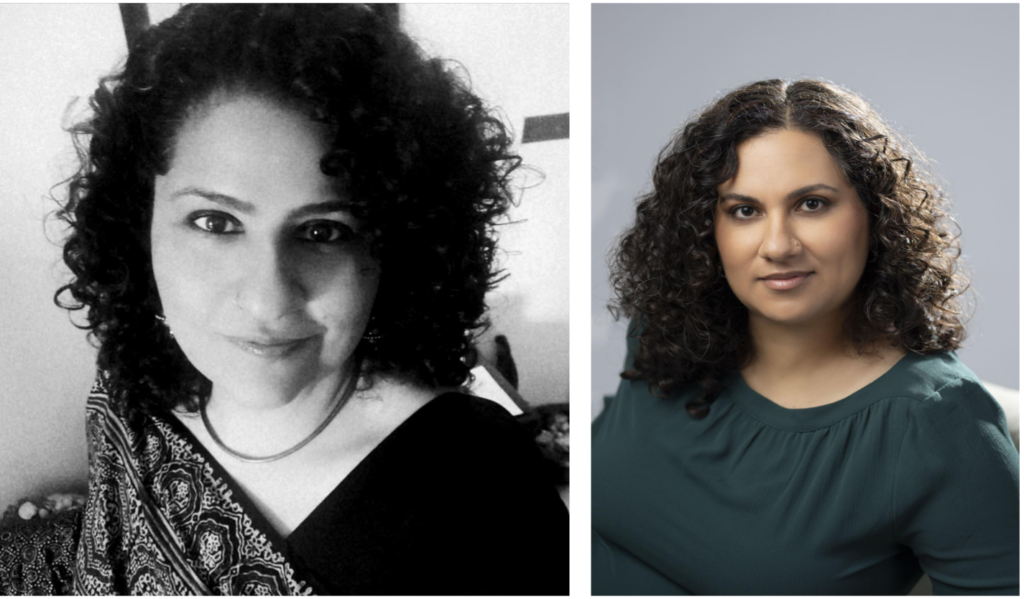
Hello everyone! We are Shama Dossa and Sadaf Shallwani, hybrid Global South/North women of colour who have been working in research and evaluation in the fields of global development and philanthropy for the last couple of decades. Shama is the Feminist Manager for Learning and Evaluation at Fenomenal Funds, and Sadaf is the Director of Programs and Learning at Firelight Foundation.
In recent years, we have been using the concept of the ‘White gaze’ to analyze the role of evaluation in international development. This blog post draws a chapter we co-authored on “Evaluation and the White gaze in international development” (see Rad Resources below).
The ‘White gaze’ is the idea that subjects draw on a particular (White) lens to observe, analyze, and intervene in the lives of Brown and Black as “objects”—whose agency is minimized. The White gaze is not just about passive observation, but rather is active, intentional, and has a lasting impact.
Evaluation in global development centers the White subject as the do-er, the Saviour, and the neutral expert. While couched in the discourse of ‘accountability’ and ‘evidence-based’ decision-making, evaluation implicitly serves as a technocratic tool for White surveillance and intervention on Brown and Black lives in the Global South.
Decolonizing evaluation requires engaging with imperialism and colonialism at multiple levels and in multiple ways. It also requires a critical reflexive analysis of the assumptions, motivations, and values which underpin evaluation practices. Thus, our analysis is interwoven with our own critical reflexive practice as evaluators and women of color in global development.
Some of the reflections that have emerged from our analysis include the following:
- Dismantling the White gaze requires explicitly talking about racism, including White supremacy, to identify where and how it shows up, how it harms and perpetuates harmful systems, and how we can disrupt it.
- A more authentic understanding of any community, situation, or intervention requires a consideration and analysis of the larger context. This includes historic and current systems of power—both local and global—that perpetuate racial inequity and harm people of colour in the Global South.
- We need to deeply engage with and reimagine the purposes and ethics of evaluation. In interrogating and unpacking many current taken-for-granted assumptions, best practices, and criteria for ‘good’ and ‘proper’ evaluations, we can create space for a more meaningful understanding of good evaluation practice. For example, we might re-define good evaluation practice as that which is respectful and non-extractive, recognizes the power dynamics; appreciates and meaningfully enables the participation and ownership of people and communities most impacted, and draws upon multiple ways of knowing and multiple forms of knowledge.
- We also need to facilitate engagement among evaluators, practitioners, and funders with the plurality of approaches to evaluation and knowledge generation. We caution however against co-opting the language and superficial implementation of any of these alternative approaches without genuine commitment and action to make meaningful changes to power structures.
- As we dismantle the White gaze, de-center the White subject, and disrupt White Saviorism, we simultaneously need to take intentional, strong, and consistent action to center the worldviews, expertise, agency, lived experiences, and perspectives of Black and Brown communities in the Global South.
Rad Resources
- Shallwani, S. & Dossa, S. (2023). Evaluation and the White gaze in international development. In T. Khan, K. Dickson, & M. Sondarjee (Eds.), White Saviorism in International Development: Theories, Practices and Lived Experiences. Wakefield, Quebec: Daraja Press.
- Pailey, R. (2020). De-centring the ‘White Gaze’ of Development. Development and Change, 51(3), 729-745.
The American Evaluation Association is hosting Decolonization in Evaluation Week with some of our colleagues. Do you have questions, concerns, kudos, or content to extend this AEA365 contribution? Please add them in the comments section for this post on the AEA365 webpage so that we may enrich our community of practice. Would you like to submit an AEA365 Tip? Please send a note of interest to AEA365@eval.org. AEA365 is sponsored by the American Evaluation Association and provides a Tip-a-Day by and for evaluators. The views and opinions expressed on the AEA365 blog are solely those of the original authors and other contributors. These views and opinions do not necessarily represent those of the American Evaluation Association, and/or any/all contributors to this site.

Indeed, while our programs are aimed at ending inequities of different sorts, our evaluation practices promote power dynamics and are hardly participatory in true sense. I believe it all boils down to empowering community workers with right information and tools so they can be equal partners in evaluation.